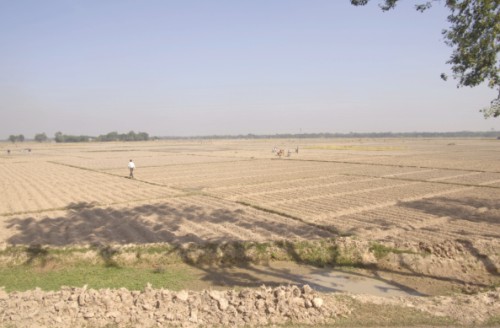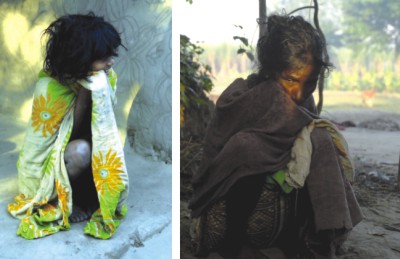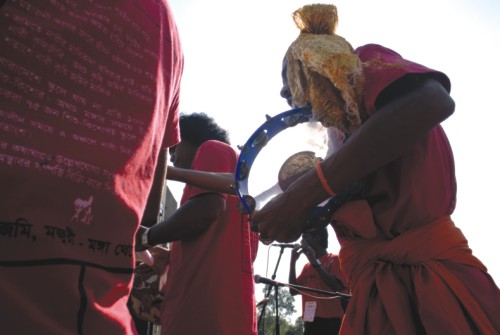|
Development
Overcoming the Fear of Poverty
Haradhan Ganguly
Amena, a landless, divorced woman living in Kurigram narrated her life story to a big gathering. She talked about being brought up in a poor family, her marriage, becoming a mother of four, falling prey to dowry and lastly getting divorced. But it was the story of how she fought against all odds defying the bane of monga, a near-famine situation, that bewitched the audience. Jobba Bewora, Karimun, Charu, Hamid, Shakhina Monowara, Farida etc. of Jamalpur, Joypurhat, Nilphamary, Lalmonirhat, Kurigram, Gaibandha and Rangpur had similar stories to tell. They were about their frustrations, lack of empowerment, vulnerability, lack of access to land and decision-making, becoming victim to social taboos and finally their victory over poverty.

These voices were echoed in big gatherings in northern Jamalpur, Joypurhat, Nilphamary, Lalmonirhat, Gaibandha, Kurigram and Rangpur--all monga hit areas. With the purpose of scaling up Monga mitigation efforts both in the field and at the policy level, monga Mukta Bangladesh (MMB) Prochar Obhijan Daptar (Secretariat) a joint initiative of Bangladesh Unnayan Parishad (BUP) and ActionAid, Bangladesh (AAB), recently launched a grand caravan from Dhaka to Gaibandha travelling to some of the monga affected districts. In the three-day journey, there was much interest among the people who gathered at the roadside meetings and meetings held in districts and upzilla headquarters. Spontaneous participation of local administrations, splendid performances of legendary Baul artist Kangali Sufia, Udichi and local artists gave a new dimension to the whole arrangement. The songs gave people a renewed determination to fight monga, not by accepting relief but by being employed.
Poverty has a wider perspective. Lack of entitlement to resources and its consequent food insecurity, unemployment, malnutrition is not unknown to Bangladesh. But when we say, ‘monga' the nature of poverty claims a different treatment due to its regional and time framing character. It is a seasonal food insecurity during the months of September, October and November in ecologically vulnerable and economically weak parts of North Western Bangladesh, primarily caused by unemployment and income deficit before the Aman crop is harvested.
The main reason for the occurrence of monga is the acute pre-harvest employment crisis among poor agrarian communities during the months of October and November in areas dependent on the traditional agriculture. So high prices of essential commodities, lack of work for agricultural day labourers, hunger, malnutrition, distress sale of livestock and household belongings, advanced sale of labour, migration of adult males, increase in money lending against high interest rates and expanding social abuse of powers against women are the ultimate consequences of monga.

Homelessness and hunger go hand in hand during Monga.
A Benchmark study conducted by the MMB secretariat says, during the monga period, 13 percent people in monga hit areas become homeless. Due to malnutrition 37 percent lose their working capacity. 88 percent are trapped in debt after borrowing from local mohajans (money leaders). Women's access to land is even more limited. Women have a huge contribution in agricultural work. Yet when it comes to ownership, only 4 percent women own land. The drop out rate in primary education is usually only 3 out of every 100 children for the entire country, but during monga 75 percent remain out of school. Violence against woman increases by 30 percent. Distress sale of belongings both movable and immovable due to the scourge of poverty is very common.
So as part of its job for scaling up monga mitigation efforts both in the field and at policy level, MMB from Dhaka ventured on caravan to Jamalpur, Joypurhat, Nilphamary, Lalmonirhat, Kurigram, Rangpur and lastly converged on Gaibandha Sadar and ended after adopting the “Gaibandha Declaration” in a large gathering. The Declaration mostly focused on a paradigm shift from a relief oriented approach to an action-based approach aiming at a sustainable solution of monga where issues like investment employment, justice, empowerment of women, their right of access to land were addressed. Land reform issues, protection against river erosion, stopping abuses like dowry, women and child trafficking, violence against women, exploitative nature of advance sale of labour, child labour and equal treatment for women in institutional credit facilities etc. were the main thrust points to be addressed. After a brief press conference in Dhaka Reporters' Unity, this grand caravan was inaugurated by noted economist, Chairman, Bangladesh Unnayan Parishad (BUP) and President, Bangladesh Economic Association (BEA), Dr. Qazi Kholiquzzaman Ahmad. Former Deputy Governor of Bangladesh Bank, Chairman Bangladesh Krishi Bank and Chairman, National Advisory Committee of MMB Secretariat Khandaker Ibrahim Khaled, ActionAid Bangladesh country Director, Farah Kabir, eminent journalist and columnist Syed Abul Moqsud spoke, among others, on the occasion.

Songs at the event gave people a renewed determination to fight Monga.
In the concluding gathering in Gaibandha, a large number of monga-affected women were present. There were also members from the local administration, civil society; freedom fighters including Taramon Bibi, took part in the programme.
“We don't fear monga, we don't fear poverty" - this was the slogan that was echoed over and over again and that was the net gain of the monga Muktir Michhil.
.Copyright
(R) thedailystar.net 2009 |
|
